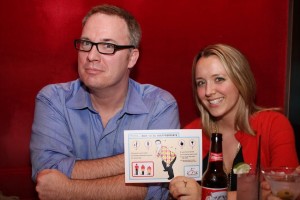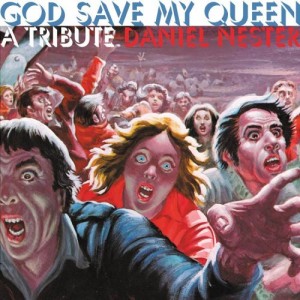by Allyson Latta
Read Part 1 of my interview with Daniel.
AL: You are very candid in writing about your personal life. Does this come naturally, or is it something you have to dig deep to do?
DN: Completely naturally. Unlike many people a lot smarter than I, I can’t really imagine other worlds or speculate on the future or even a past other than my own. I have to work with my own life’s materials.
AL: The essay we discussed in Part 1, “Garden Path Paragraphs,” about the emotional journey you and your wife took to have a baby, must have been a difficult one to write given the emotional weight of the experience. Was it more challenging to write than some of the lighter pieces?
DN: Not really. It was easier, actually. I mean, writing funny pieces is hard work. They have different demands, for sure, but I think I am more practised at writing memoir-ish pieces than writing straightforward humour. I’m still learning. I would love to have a good humour piece that I can be super-proud of like I am of “Garden Path Paragraphs” or “Goodbye to All Them,” but I haven’t yet. Not sure if that answers your question, but that’s what it got me thinking about
AL: Yes, it does, though it might surprise some readers to think that writing humour can be more difficult than writing about deeply personal subjects. Speaking of “Goodbye to All Them,” it was one of my favourites among your essays. It’s a thoughtful, sharp and also funny piece about your decision to leave poetry-writing and New York City, for creative nonfiction and Albany. Was there a certain catharsis for you in getting this down on paper?”
DN: Oh totally. I had been taking notes on that for three or four years and finally got it together just before the book was finished. Living in New York City merely magnifies the perverse phenomenon of being a poet in the current scene of publishing and networking and 24/7 relentless self-promotion, as Jim Behrle calls it. When you can’t see the forest for the trees, as I did, you get obsessed with current fashions—no narrative poetry, don’t make sense, and heaven forbid if you write with a lyrical “I.” To be able to interact with hundreds, thousands of poets on a regular basis amplifies all these issues. It forces the question for the poet who is still trying to make his or her way in the world. It’s possible now for a poet to spend all his or her time online, commenting and blogging and writing and generally looking over the shoulders of people in the hopes of getting to some elusive Poetry Prize. This might sound depressing, but even more depressing is that the decisions have by and large already been made by a not-so-secret cabal of people whom most of us will never meet. Maybe what I brought to the table with “Goodbye to All Them” is that I interacted with members of the cabal and wrote about it in a less-than-reverential manner.
AL: How does creative nonfiction allow you to express yourself that poetry didn’t?
DN: Saying things directly. A different, perhaps less precious context.
AL: I’m interested in your distinction between writer and author, expressed in your Questionless Books Interview with poet George Murray on Open Book Toronto:
“At his/her core, a Writer is someone who puts his or her ass in a chair and types.
“As opposed to an Author, who is a construct of a writer, not a person at all, a persona or ghost or double-agent.”
Do the two co-exist harmoniously in you, or do they battle it out?
DN: They have to co-exist, for one. I think sometimes they might battle it out, sure. I mean, one consciously or unconsciously makes choices of how to present themselves on the page. This could be persona or voice or even tone, and readers aren’t always going to think about the writer as they read a work; but the two are different. If you want to get all literary theory about it, my go-to quote appears in this thing I wrote about the James Frey Affair:
“An author is not a person,” Pierre Lejeune writes in his “The Autobiographical Pact.” He is “defined as simultaneously a socially responsible real person and the producer of a discourse. For the reader, who does not know the real person, all the while believing in his existence, the author is defined as the person capable of producing this discourse, and so he imagines what he is like from what he produced.”
AL: Have you ever regretted writing anything that made it into print? Why?
DN: Plenty. Pu-lenty. Pawlenty.
AL: Such as …
DN: Mostly blog posts and stuff like that.
AL: Has raising daughters changed your attitude toward inappropriateness? Your writing in general?
DN: Those are hard questions. Our daughters have changed a lot of the way I live day to day. But if anything, since their births I want to write things in an even more true and honest way, but that’s probably me being a self-important breeder or something. I love my girls, but the Nester Sisters are their own people, and they’re inappropriate in their own kiddie ways.
AL: I have to ask this. Have some readers of How to Be Inappropriate come away disappointed because it doesn’t in fact spell out “how to”?
DN: Jesus Christ on a Cracker, I know you’re kidding but I have read some online reviews where people did actually think HTBI is some sort of how-to.
AL: I understand your current project is a longer memoir, and in an interview with Lynette Benton you said, “[W]riting memoir is freaking hard…. I want to tell my story honestly and also compellingly; I know that I have to pick on myself and show my many faults, and that is hard work. It’s not like you can just have a normal day after writing about one’s darkest thoughts. Or at least, I can’t.” What, then, keeps you working on this manuscript?
DN: I do feel I have a story to tell. I feel like if I can write my story, or some of my story, I will discover what makes me tick, and that I will in turn understand myself better, and maybe help others do the same. That’s what the best memoir/first-person nonfiction does. It doesn’t just tell a story; it offers wisdom. I haven’t found the wisdom in what I am writing about, not yet at least, and the thought has occurred to me that it’s the thrill of the chase that I enjoy more than the product; that, once this journey of writing about part of my life is over, I’ll have nothing left to say. So there’s fear and joy all around.
AL: What advice would you have for other writers struggling to “find the story” in their lives?
DN: Use the retrospective voice when you can and it will help your writing; Phillip Lopate talks about it here, in a touchstone essay for me in my teaching as well as my writing.
Keep writing. Blog. Don’t listen to preachers in the solipsism-is-bad camp who seem to think that use of the pronoun “I” is a cardinal sin or the quest for self-discovery is only for other, more important people. History starts with your own biography. Work hard. Write one sentence at a time. Don’t show writing to your family. Think of yourself in the first, second, and third persons. Read The Memoir and the Memoirist by Thomas Larson. Read and feed your head.

